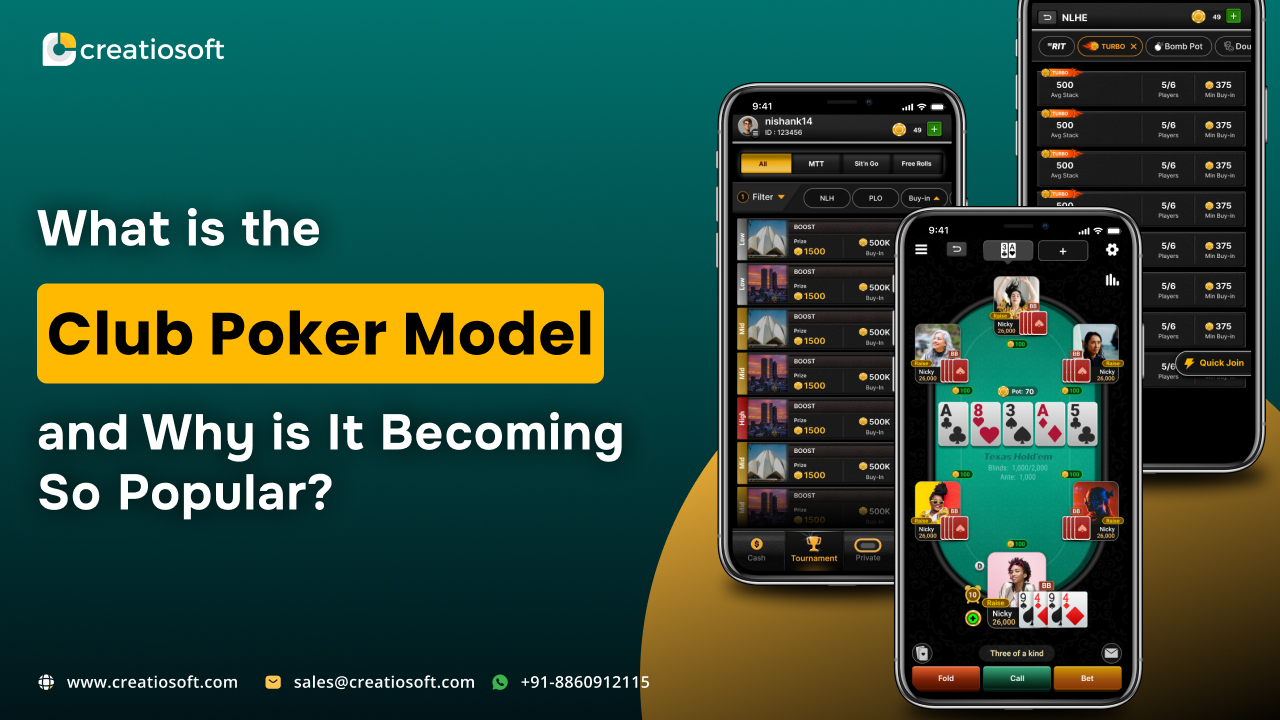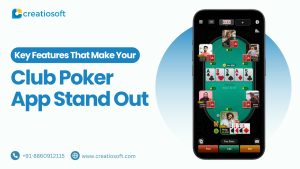One of the biggest trends shaking up the poker industry right now is the Club Poker model. If you’ve been hearing about “poker clubs” or “club-based platforms” and wondering what all the buzz is about – you’re not alone.
That’s Club Poker – an absolute revolution in how online poker is bringing the game closer to being personal, social, and truly immersive. It merges the excitement of home games with the technology to afford players control, community, and belonging like never before.
The real kicker, though, is that this model isn’t just growing; it is absolutely exploding all over the poker world. To anyone, from a player to a club owner to an operator, Club Poker is a massive opportunity.
But before we delve into industry-altering talk, let’s first understand what makes Club Poker extremely revolutionary.
What is the Club Poker Model?
Club Poker is, at its core, an innovative structure in which poker games are hosted in private or semi-private clubs, not openly accessible to the general public. Players register in clubs presided over by the owner, who sets the rules on stakes, buy-ins, gaming format, and timing of the games.
Generally, operators are referred to as “app owners,” as they provide the back-end platform, tools, and infrastructure for clubs to be launched; club owners then define and manage the front-end, day-to-day aspects in terms of player community and game experience.
It also means these clubs get together to create unions that organize joint tournaments, pool players, and even run events on a larger scale.
In short, club poker duplicates the social inventiveness and aggressiveness of an ordinary home game; however, this time online, university online, and still with robust game-management capabilities.
How Does It Work?
For better understanding, let’s see how Club Poker Model works:
- App Owners: They take care of the platform, backend and tools, although they do not make up part of the player activities; they deliver them to the players.
- Union Owners: They are the owners of the parent organization that manages several clubs together and organizes large tournaments whereby complete regulation is accomplished over any inter-club activities to maximize liquidity.
- Club Owners: They are at the operational level of a single club; they set the rules and manage players, creating a good game environment for their respective club.
- Club Managers: The day-to-day activities of the club house are managed by them, with a player-engaging environment, under the guidance of the club owners.
- Club Agents: Recruit players to have them relate to the clubs and increase their clubs’ reach.
- Sub Agents: Help agents in boarding players and expanding their reach.
- Members/Players: Participants in several games, tournaments, and community activities.
Also Read: Top 10 Features That Make Your Club Poker App Stand Out
Why Is It Getting So Popular?
-
Community & Familiarity
The greatest reason why Club Poker is gaining popularity is its community. Instead of getting segmental tables full of strangers, with this new model, players get to compete with friends, acquaintances, or like-minded players. It brings back the lost camaraderie and trust of real-time home games.
-
Low-Threshold Entry & Flexible Stakes
Beginners no longer have scary buy-ins to face or super-tough opponents – it allows you to start small, flexible stakes, and accumulate confidence at the stakes level while keeping an open invitation to novices and casual players.
-
Personalization & Control
Club owners from the online poker club business have everything at their command, and that can be from blinds to buy-ins, formats, and styles of tournaments. Players choose clubs that define their vibe and preferences, leading to tailored experiences.
-
Safety & Trust
Most worries concerning unfair play or bots can be taken away by playing in a known, moderated environment. The private level builds trust and makes it feel safer.
-
Feature-rich Game Variety
Not only do these clubs have games such as Hold’em, but they also include variations in Omaha Stud mixed games, creative tournaments, leaderboards for their spin on games, held and bomb pot tournaments, and rabbit hunting held by the club.
-
Interaction and Social Engagement Tools
Most such clubs come with a chat feature, session scheduling, stats tracking, the creation of love leaderboards, and much more – facilitating a social bond and competition.
-
Efficient Monetization & Viral Growth
In contrast, the operator has multiple monetization streams that are organically scalable across:
- In-app purchases – Chips, Boosters, Packages
- Rake (usually lower or even optional within club formats)
- Tournament Fees
- Club and Union Membership Model
- Referral & club-driven growth with Customer Acquisition Cost
-
First Mover on Mobile
You can play Club Poker on mobile – modern deployments are very mobile-centric, allowing play anytime, anywhere, and payment is integrated through notification.
Also Read: How to Develop a Club-Based Poker App Like KKPoker?
Summarized Benefits: For Players & For Operators
For Players
- Secure, personalized gaming within a community of mutual trust
- Reduction in the barriers to playing poker to have more widespread participation
- Game variety with creative formats
- Chatting, tournaments, and leaderboards afford socializing opportunities
For Operators
- Entry point into the market with a scalable setup that is low in cost
- Many monetization paths with a flexible fee structure for each online poker club business
- Club growth by word-of-mouth and, naturally, through new club expansions
- Ability for management of the game environment, data, and compliance
Don’t just witness the revolution of poker; join in. Contact the Creatiosoft team to develop a club-based poker app to get ahead of the game.
What to look for?
-
Regulatory Compliance
Some programming structures are built keeping in view the local laws and regulations, like the membership fee model vs rake in Texas. So, some clubs are charging membership fees to avoid legal issues, while some are using the rake model to drive away competitors.
-
Platform Security & Fair Play
Some of the best tools in security guard against collusion, fraud detection, and identity theft. These may involve GPS and IP monitoring, as well as logging transactions.
-
Managing Fragmentation
Poor union networks and game liquidity might invite user distress if not managed thoughtfully.
-
Technical Complexity
Real-time performance, multiformat access, cross-platform accessibility, and secure payment handling become the need of a robust technical infrastructure.
Conclusion
The Club Poker model marries the format, thrill, and personalization of live home games with the technology and reach of online platforms. It empowers operators to deliver experiences tailored for every player, enables players to find their community , unlocks diverse monetization pathways while breaking entry barriers, and fosters significant trust.
There is an increasing requirement for club-based poker platforms worldwide, and now is the right time to proceed with that model. Starting from developing your club app for poker or integrating into the business you already own, the right technology partner can do wonders.









